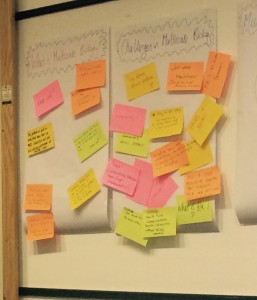What is Multi-scale Biology?
That was the overriding question that occupied attendees of the inaugural meeting of the Multi-scale Biology Network, held at the University of Nottingham on June 1st 2015. This newly funded BBSRC network brought together biologists, physicists, engineers, and the funding bodies (amongst others) for this meeting that aimed to set the agenda for this area of future collaboration. Storify of the meeting.
Those who had also been involved in the genesis of synthetic biology policy might have felt a touch of deja-vu over the questions being asked at this meeting. However whereas the term ‘synthetic biology’ might have remained opaque after those early meetings, the feeling at the end of this day was that good progress had been made into an understanding of what this network might achieve.
Although there were <a href="http://www.multiscalebiology.org.uk/events/event/springboard/" onclick="_gaq.push(['_trackEvent', 'outbound-article', 'http://www cialis 20mg en france.multiscalebiology.org.uk/events/event/springboard/’, ‘speakers from a range of biological disciplines’]);” target=”_blank”>speakers from a range of biological disciplines there was no requirement for forced interactions between different research areas. Instead there was a sense of ‘wondering what can be learnt‘ when for example, plant scientists talked to neurobiologists…
The meeting was kicked off by Professor Markus Owen from the Nottingham Maths department and the agenda had been clearly designed to encourage significant amounts of discussion, be it during the lecture period or over an extended lunch in which attendees split into small groups to discuss challenges in MSB.
Many of the attendees were involved in some form of systems biology so the sense was that MSB comes as the natural extension of that area of research. Instead of looking at a single network, how should researchers extend their thinking to include how these networks interact at different scales…..without losing the quality of analytic data?
Professor Alfonso Martinez-Arias (Cambridge) led the first discussion and made the important point that even though we now have enormous amounts of data, what is it we actually want to learn?….and is focusing on that type of question compatible with current necessity for publication in high quality journals?
Immediately after lunch Professor Carole Goble introduced a new ERASysApp network (FAIRdom) in which she is involved that aims to ensure that systems biology projects make their data, operating procedures and models, Findable, Accessible, Interoperable and Reusable (FAIR). This was a timely reminder that it is very important to produce data that is reusable by the community so that people aren’t reinventing the wheel in each experiment. In 2016 GARNet will be hosting a meeting with the Exeter Centre for the Study of Life Sciences that will address issues surrounding data reuse. Details to follow later in 2015!
Toward the end of the day Professor Martin Howard from the John Innes Centre led the final discussion that attempted to coalesce the thoughts of attendees. One suggestion was for biologists to act ‘like engineers’ and to use ‘dirty tricks’ as to get tasks completed. Understanding the details can come later…. getting the job done is most important….. whatever the job is that needs to be done! It was also discussed that coming to any ‘effective theory’ of biology is almost impossible given the unpredictable nature of the field.
Overall it seems that making any decisions about how multi-scale biology projects can be implemented will depend on the funding environment. To that end Michael Ward from the EPSRC stressed that mathematical biology is important for mathematical science funding and urged attendees not to be put off from looking in their direction. Ceri Lyn-Adams from the BBSRC informed the group that although there wasn’t any money specifically ring-fenced for MSB, they welcome applications in this area under existing mechanisms. What was clear is that MSB and systems biology remain in the forefront of BBSRC funding strategy!
By it’s very nature MSB will require large projects that might bring together a few responsive mode-size projects under a single umbrella. Hopefully new researchers will be able to be involved in this type of project and the money doesn’t all go to large established groups.
Plant Scientists were well represented at the meeting most notably by Martin Howard, Malcolm Bennett and Leah Band, who gave the final talk of the day. The multi-scale nature of plant biology was highlighted in this more than any other talk, as Leah discussed biology at the organismal, tissue, network, cellular and enzyme level. Her work builds the prior knowledge of GA transport and biosynthesis to make mathematical models to predict tissue expansion.

Importantly for the GARNet community, the take home message from the meeting was that plant scientists will play a major role in the future of multi-scale biology so once the funding opportunities are revealed they should not be reticent in submitting bids.

